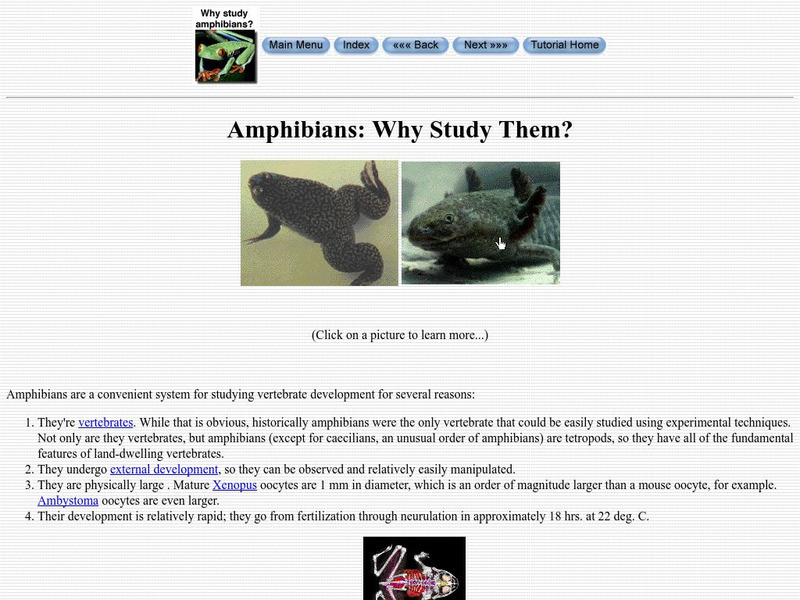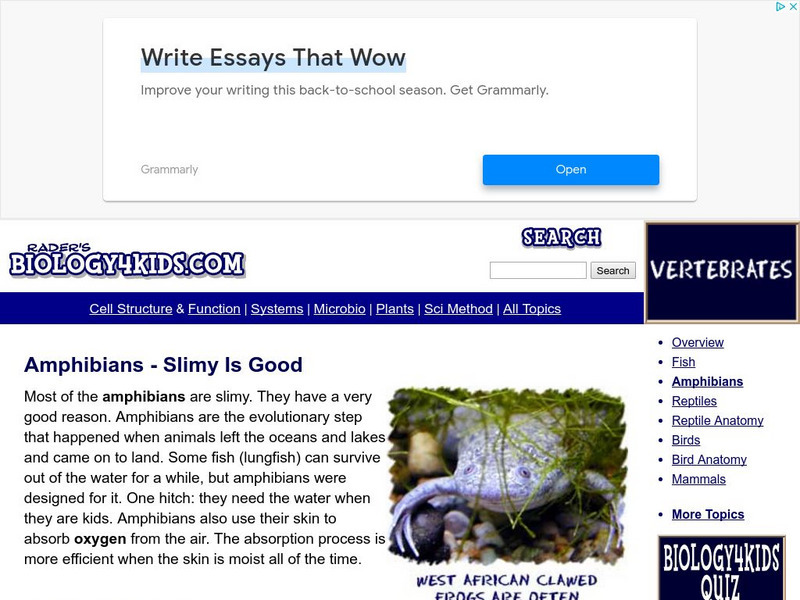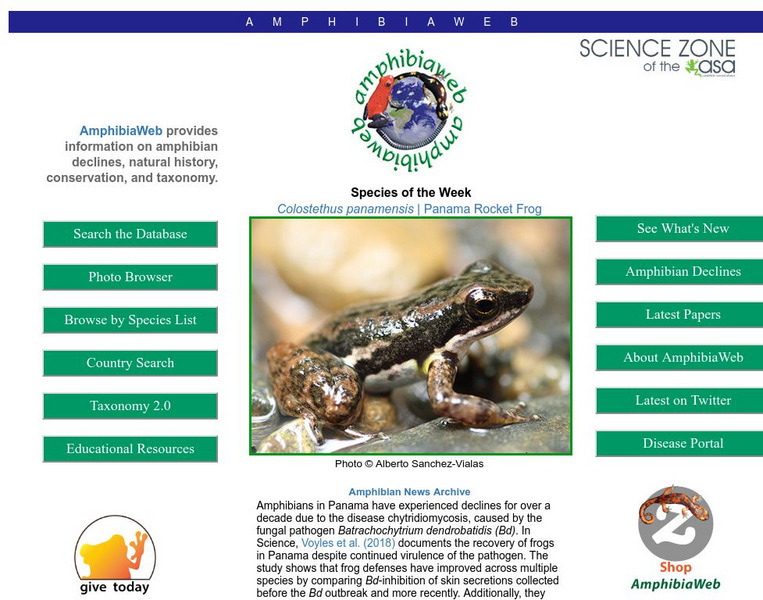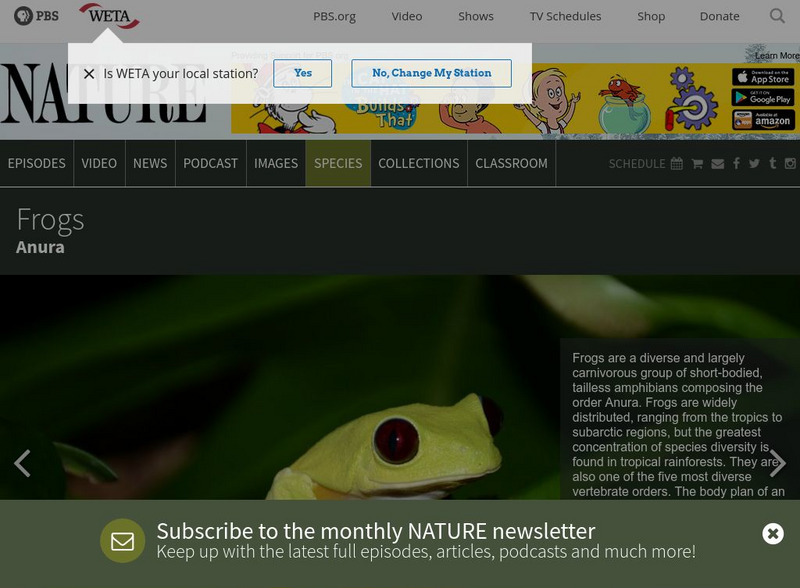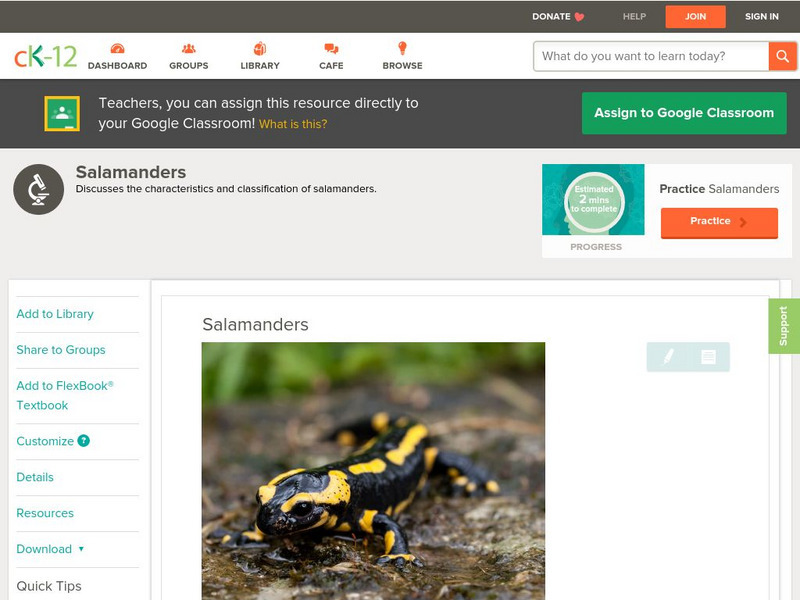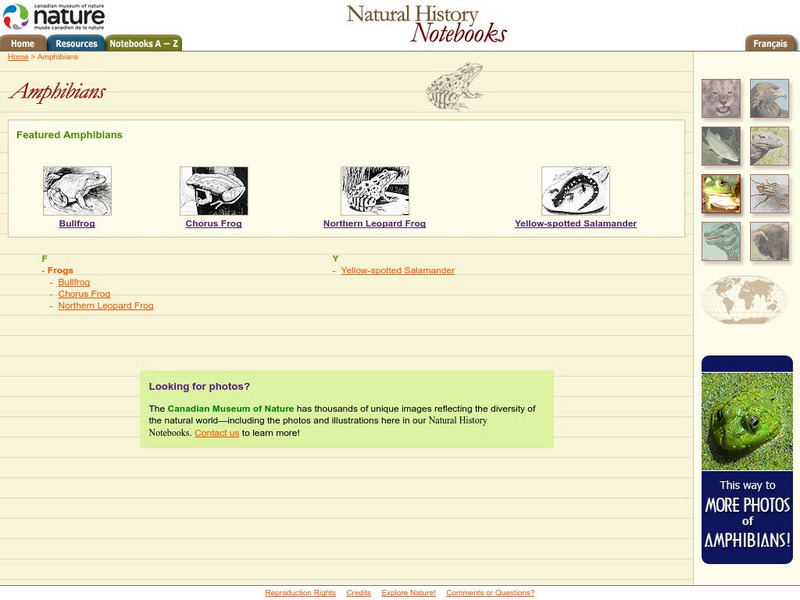University of Wisconsin
Amphibians: Why Study Them?
A basic description of why we study amphibians. This site contains an interesting three-dimensional reconstruction of a frog skeleton.
Australian Broadcasting Corporation
Australian Broadcasting Corporation: News in Science: Early Amphibians Bit First, Walked Later
From ABC News in Science, Will Dunham's article explores the evolutionary history of eating habits within the realms of amphibians. It specifically refers to the ancient amphibians use of biting food rather than sucking it.
Biology 4 kids
Biology4 Kids: Amphibians Slimy Is Good
An overview of amphibians. Find out why their skin is slimy when they're on dry land.
Encyclopedia of Life
Encyclopedia of Life: Amphibians
Thorough resource investigates amphibians with a description, pictures, and maps. Includes facts on ecology, evolution, biology, and external links.
University of California
Regents of the University of California: Amphibia Web
AmphibiaWeb, a site inspired by global amphibian declines, is an online system that allows free access to information on amphibian biology and conservation. This site is filled with amphibian facts, a glossary of terms, species numbers,...
Smithsonian Institution
Smithsonian Education: Toads, Turtles, Snakes, Salamanders, and Other Creepers
Smithsonian Education presents Reviled and Revered: Toads, Turtles, Snakes, Salamanders, and Other Creepers and Crawlers. Get the facts about reptiles and amphibians. Learn about their unique characteristics, as well as explore why we...
PBS
Pbs: Nature: Frogs: The Thin Green Line
PBS documentary explores threats to the continuing survival of frogs at locations around the world owing to habitat loss, pollution, and a fungus called chytrid now known to be responsible for killing large numbers of amphibians. [50:31]
Biology 4 kids
Biology4 Kids: Quiz: Amphibians
Take this ten-question review quiz over the Class Amphibia. Read more about each question after an incorrect answer is given.
Other
Sc Reptiles & Amphibians: Eastern & Florida Cottonmouth
South Carolina Reptiles & Amphibians profiles the eastern cottonmouth. A great site for photos-- both the eastern and Florida cottonmouth are pictured.
Other
Reptiles and Amphibians of the Uk: Grass Snake
The most common species in the UK, the Grass Snake is identified by the Reptiles and Amphibians of the UK website. Detailed description and photos included.
PBS
Pbs Nature: Frogs and Toads
Do you know how to tell the difference between a frog and a toad? This site provides interesting facts and information about this type of amphibian from where they live to what they eat and more.
Other
Quantum Conservation: Amphibian Index
A good overview and index of all the classes and species of amphibians, including sub-classes, orders, and characteristics.
Nature Canada
Nature Canada: Suffield National Wildlife Area: Amphibians at Risk
The Great Plains Toad and the Northern Leopard Frog live in Suffield National Wildlife Area in Alberta, among other areas. These are two Canadian amphibians whose wetlands habitats are increasingly threatened by human activities....
Ducksters
Ducksters: Animals for Kids: Amphibians in Danger
Kids learn about the decline of the amphibian population. Why are they endangered and what is causing it.
University of Michigan
University of Michigan Critter Catalog: Frogs & Toads
This competent site provides general information about amphibians and then focuses on the amphibians found in southeastern Michigan. Information, pictures, sound clips, and classification groupings are provided.
Smithsonian Institution
Smithsonian National Zoo: Zoogoer Magazine: On Waterdogs, Mudpuppies, and More
Alex Hawes's article, "On Waterdogs, Mudpuppies, and the Occasional Hellbender" looks at the range of creatures within the classification of Amphibian. He does not spend time discussing frogs or toads in depth, but focuses on the rest of...
San Diego Zoo Global
San Diego Zoo: Caecilian
Learn about an odd legless order of amphibian called Caecilians. This article details their habitat, physical characteristics, and methods of producing young.
CK-12 Foundation
Ck 12: Life Science: Salamanders
[Free Registration/Login may be required to access all resource tools.] Salamanders are characterized by slender bodies, short legs, and long tails. They are most closely related to the caecilians, little-known legless amphibians. Learn...
ClassFlow
Class Flow: Reptiles and Amphibians
[Free Registration/Login Required] This flipchart provides basic information for the characteristics of reptiles and amphibian and life cycles. Videos show reptiles and amphibians that can cruise through the air, and an alligator mom...
Encyclopedia of Life
Encyclopedia of Life: Amphibians
The Encyclopedia of Life presents this in-depth overview of Amphibians (Amphibia), including their habitats, size, conservation status, and much more. Images of this class and maps of its global distribution can also be found here.
Canadian Museum of Nature
Canadian Museum of Nature: Amphibians
Provides fascinating facts and images of frogs and salamanders plus a map of where they can be found.
Curated OER
University of Wisconsin: Amphibian Embryology Tutorial
This amphibian embryology tutorial takes an in depth look at the question "Why study amphibians?". Through this tutorial students will develop a better understanding of vertebrate development.
Other
Amphibian and Reptile Conservation: Natterjack Toad
Description of the Natterjack Toad, including how to identify it, and its life cycle. It also provides a video [6:06] of an edition of the Living World with Lionel Kellaway, focussing on the natterjack chorus.
Other
Project Exploration: Project Frog
This site documents the field work of PhD researcher Dave Blackburn as he travels through Cameroon in the sub-Saharan region of Africa to study some little known amphibians. If you think you'd like learning about the hairy frog, or some...
Other popular searches
- Reptiles and Amphibians
- Amphibians With Worksheets
- Fish and Amphibians
- Reptiles Amphibians
- Amphibians and Reptiles K 2
- Frogs and Amphibians
- Reptiles & Amphibians
- Animal Needs Amphibians
- Amphibians That Hibernate
- Amazing Amphibians
- Types of Amphibians
- Amphibians With


